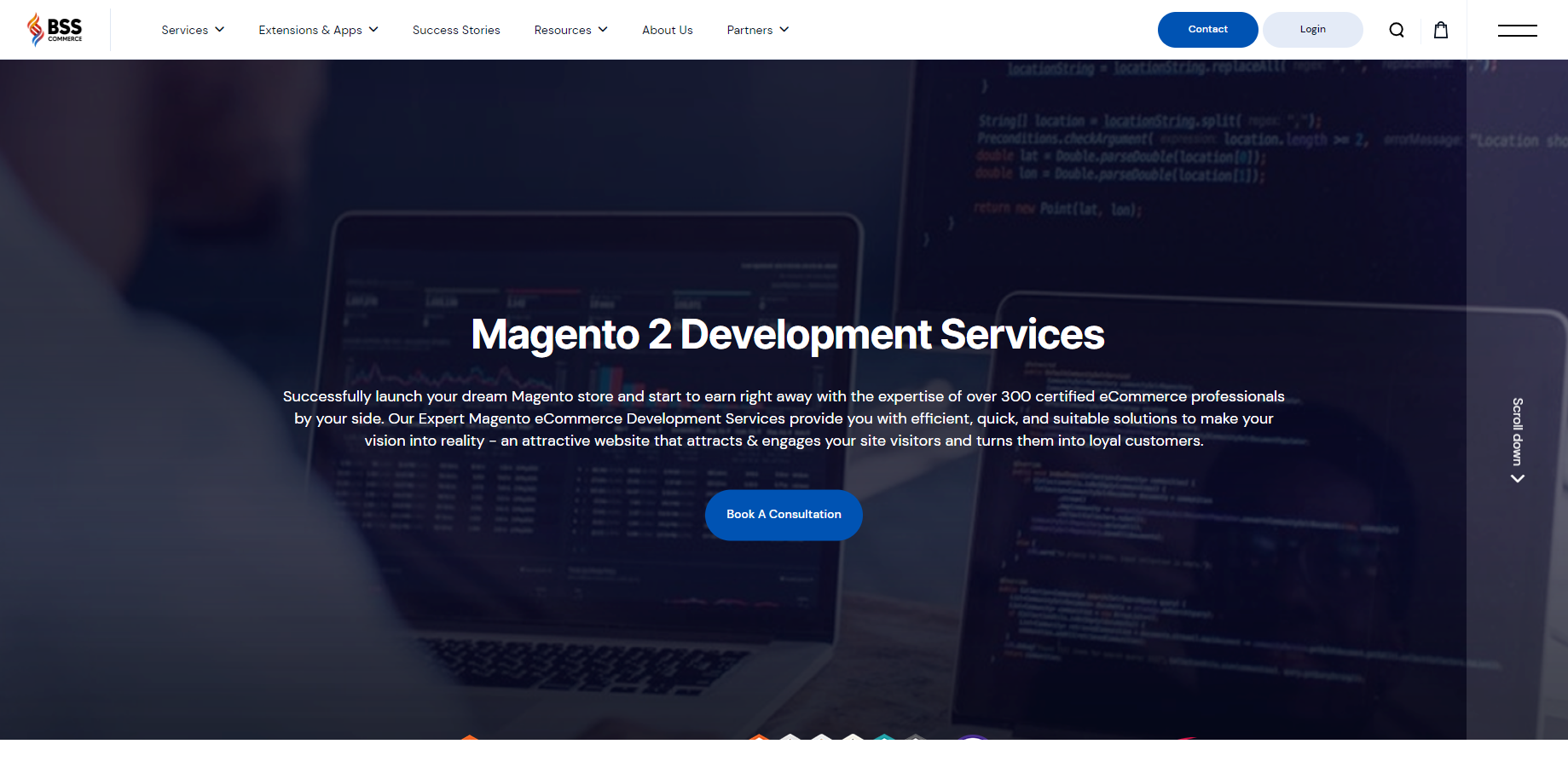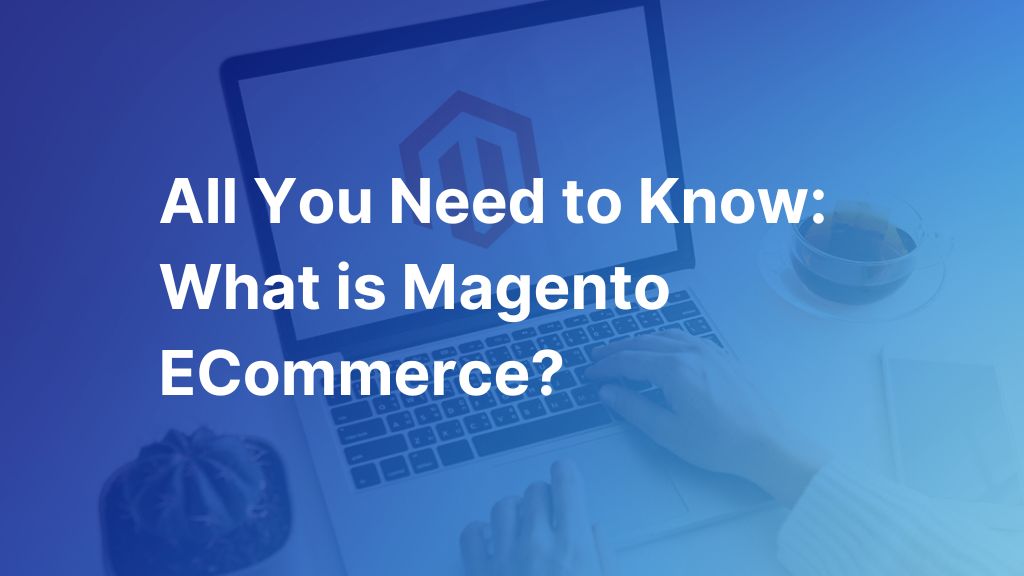What Is Magento eCommerce?
Table of Contents
Magento eCommerce (also called Magento Commerce or Adobe Commerce) is an open-source eCommerce platform famous for its strong customization capabilities and ability to integrate with many other third-party systems. According to statistics from Statista and Earthweb, Magento was one of the leading eCommerce platforms in the world in 2023.
Although it provides users with strong customization capabilities, Magento requires users to have certain technical knowledge to build and operate an eCommerce store on it. This article will help businesses better understand Magento, how to utilize its outstanding features, and the detailed steps to set up your store on the Magento eCommerce platform.
Let’s dive in!

What Are The Pros and Cons of Magento eCommerce?
Due to its numerous advantages, Magento Commerce is utilized by many companies to create eCommerce stores.
- Functional system with extensions for eCommerce needs, ranging from basic to complex.
- Adaptable customization features that enable function creation and source code modification in accordance with business requirements.
- High scalability, enabling multilingualism, currency conversion, and shop expansion from one to numerous locations.
- Strong security features, including unauthorized bot protection, security solution suggestions, and recurring system control.
Although Magento eCommerce possesses many advantages suitable for many types of businesses, building an eCommerce store on an open-source platform has never been easy:
- High development cost: In addition to maintenance fees, businesses could have to pay more for development teams to provide specific features and adaptations or for third-party integration platforms.
- Time-consuming website building process: It can take up to 1 year to deploy a mature Magento eCommerce store.
- High-skilled in-house technical team may be required to continuously create, maintain, and enhance the website’s performance.
Magento Community vs Adobe Commerce vs Adobe Commerce Cloud

What is Magento eCommerce? Magento eCommerce includes 3 editions: Magento Community (Magento Open Source), Adobe Commerce (Magento Commerce), and Adobe Commerce Cloud (Magento Commerce Cloud). They are specialized in supporting the construction of eCommerce websites.
Magento Community Edition was originally known as Magento Open Source. Magento Community is offered without charge to small businesses, and nonprofit organizations. Many small and medium-sized enterprises and eCommerce startups are utilizing this version thanks to its flexible framework for building eCommerce websites.
Magento Commerce is the second version of Magento. Magento Commerce offers hosted platforms as Platform-as-a-Service (formerly known as Magento Commerce Cloud Edition) or on-premises solutions (previously known as Magento Enterprise Edition or Magento Commerce) for businesses. This paid version is designed for businesses and corporations with large business scales and many strong expansion and development needs, with a minimum annual price of $24,000.
| Compare | Magento 2 Open Source | Adobe Commerce | Adobe Commerce Cloud |
| Licensing | Free and open-source | Proprietary and paid | Proprietary and cloud-based |
| Features | Robust core functionality, customizable, and versatile | Includes all features of Open Source, plus additional enterprise-grade capabilities like advanced marketing tools, B2B features, and improved performance. | All features of Adobe Commerce, plus the benefits of a fully managed cloud infrastructure. |
| Cost | Free, but additional costs may arise for hosting, extensions, and customization | Requires an upfront licensing fee, with ongoing maintenance and support costs. | Subscription-based model, with pricing based on usage and features. |
| Support | Community-driven support, with paid options available | Comprehensive support directly from Adobe | Comprehensive support from Adobe, including managed services. |
| Scalability | Suitable for businesses of all sizes, but may require more technical expertise for large-scale operations | Designed for high-traffic and complex e-commerce operations | Highly scalable and designed for large enterprises. |
The Key Features of Magento eCommerce
Product & Order Management
Magento can accurately manage import, export, and inventory information entirely automatically. You can easily control categories, product lists, and warehouses. This platform also supports the integration of many product illustrations, options when users rate products, lists of favorite products, as well as inventory import and export management.
However, managing stock levels is crucial to avoid missed sales opportunities. If you’re looking for a solution to track and notify customers about out-of-stock products, check out our Magento 2 Out of Stock Extension!
Security Feature
Magento 2 versions have a high level of security, especially the Magento Commerce version. This helps businesses safely deploy online store infrastructure on this platform without worrying about cybersecurity attacks or data theft.
Magento is equipped with a periodic security scanning tool. This tool will help identify system security issues and also update security patches. From there, your store will always improve and optimize security effectively.
In addition, Magento also has many extra security layers to increase the security level for administrator and user accounts, such as password standards and 2FA.
- The administrator password must be at least 7 characters long, including letters, numbers, and special symbols. Depending on additional modifications, the password may be made more complex in terms of lowercase/uppercase characters, or require a re-login after a certain session length.
- The 2FA (Two-Factor Authentication) function supports additional security for user accounts on the system. Accordingly, after logging into their account, customers must authenticate with an OTP security code sent to their phone number to effectively limit threats of unauthorized access and attacks on user accounts.
Not to mention, the system is also equipped with an additional layer of security with CAPTCHA for both website administrators and users. Using CAPTCHA helps the system prevent spam from bots and malicious code from illegally entering the system.

Themes
Magento offers consumers a vast theme library with excellent versatility and a highly wide theme selection. These themes are created by the world’s top theme vendors as well as the Magento community itself. You may entirely adjust the theme that best fits your store’s structure and style. Thanks to Magento themes’ excellent compatibility and responsiveness, your website will run smoothly on all platforms and browsers. If you are still not sure which theme to pick for your store, then you’d better have a look at 73+ Best Magento 2 Themes Free & Premium.
SEO Features
Magento includes an SEO-friendly CSM (Content Management System). Magento SEO allows you to optimize a lot of SEO features, such as:
- Search engine friendly URLs
- Sitemap
- Navigate by class
- Product title
- Keyword
- Meta tag
- Description tag
Regarding SEO, Magento always updates the latest SEO ranking factors. It provides great URL structure and options to optimize important meta tags for SEO.
Analytics & Report
Magento offers a variety of capabilities to help users analyze their shop performance, including reporting, analytics dashboards, and consumer segmentation. These features include some built-in reports for monitoring your store’s success, such as revenue, orders, best-selling goods, new customers, and so on. Store owners may also use the dashboard to receive an overview of their store’s performance, which includes charts and basic indicators such as revenue, order volume, and conversion rate.
Magento may also link with other analytics systems like Google Analytics, allowing users to completely track and evaluate the performance of their online business.
Integrated Payment Gateways
Magento enables users to place orders and make payments with ease using payment processors like PayPal, Authorize.net, Google Checkout, and more. Furthermore, companies may more affordably and simply incorporate payment gateways from third-party payment modules like eBay, Cyber Source, eWay, and so on. options,
Marketing Tools
On the platform, Magento offers business owners strong marketing options including coupons, rebates, and personalized advertising campaigns. Additionally, you can also utilize additional incentive schemes like loyalty or membership cards. This facilitates businesses with piece-of-cake program deployment and management within the online store.
Customer Support
Magento provides assistance via its help center, user manual, and ticket submission mechanism. However, as an open-source platform, Magento’s support cannot be as well-rounded as other hosted eCommerce platforms.
In addition, Magento has a sizable global community with around 450,000 members. If you have difficulty setting up your store, you can always turn to the community’s helpful support members for assistance.

Magento provides assistance via its help center, user manual, and ticket submission mechanism
Extensions
Magento can provide any custom modifications for your business thanks to its robust extension ecosystem, which has up to 4445 extensions. Magento extensions cover a variety of areas, including payment, shipping, marketing and SEO optimization, customer experience enhancement and management, and so on.
Although free extension versions may meet the majority of an eCommerce store’s needs, many consumers prefer premium extensions due to their more advanced features and capabilities. However, choosing trusted providers is critical to ensuring your store’s safety, security, and efficiency.
If you’re seeking a unified on-premises solution with advanced synchronization capabilities, BSS Commerce, a reputable Magento extension vendor, could be your best option. Here’s why.
- Solution-oriented: We are committed to addressing your business difficulties through lean, accurate, and effective solutions. This has been demonstrated by the confidence of over 75,000 delighted and trustworthy clients globally.
- Feature-rich and high-quality: BSS Commerce, with their team of Magento professionals, currently serves as the leading Magento 2 extension vendor. Our team consists of Magento solution professionals, certified developers, and ISTQB testers who are responsible for providing customers with over 180 comprehensive end-to-end modules with the highest standard.
- Transparency: All modules are delivered with a complete development roadmap. This has been proven through more than 10 years of effort as an Adobe Bronze Partner and ISTQB partner. We are devoted to providing exceptionally affordable rates that are suited to the demands of your company, with no hidden costs. Our services are always backed by exceptional customer service. With 4.9 ratings on Trustpilot, we promise that every request will be handled within one hour.
Top Alternatives To Magento eCommerce
When compared to other open-source eCommerce platforms like WooCommerce, Magento certainly has numerous advantages, such as flexibility and customization. On the other hand, if you’re not tech-savvy and want to use an intuitive, code-free platform, hosted eCommerce platforms like Shopify and BigCommerce are the most popular eCommerce store vendors that you should take into consideration. Below is a detailed comparison table of these 4 platforms:
If you’re interested in more in-depth comparisons of each platform, check out the articles below:
Overall Steps to Launch Your Store on Magento eCommerce
Set Up Your Hosting and Domain
Hosting and domain are basic components of a website, not only Magento but all other types of websites. Choosing a domain is about naming your online store. Because of this, you should select a domain that reflects your brand name and leaves an impression on the customer’s attention.
Furthermore, choosing the finest hosting will ensure that the essential elements of your website—such as availability, security, and traffic handling capacity—are met. AWS, Bluehost, Hostinger, Dreamhost, and other respectable hosting companies are some that you might want to take into consideration.

Hosting and domain are basic components of any eCommerce website
Download and Install Magento
Once you’ve set up your name and hosting, download Magento to your computer by navigating to the tech resources area of the Magento website. After that, you unzip Magento and transfer it to your hosting using the FTP protocol to configure your website.
The remaining thing is to set up the website configuration on your website. You need to fill in:
- Admin username and password
- Location of your Magento installation on your server
- URL path for your admin login page
Complete the all Magento requirements to successfully set up your Magento website.
Install a Magento Theme
As we move on with our Magento store, let’s choose a theme for your store and begin personalizing it to fit your preferences and brand.
You can purchase your Magento theme from a plethora of sites, including ThemeForest, TemplateMonster, and others. On the other hand, we strongly advise you to select a theme from the Magento theme marketplace for better quality and consistency.
Customize Theme
Once you’ve chosen a theme for your store, you can personalize the layout of your website. Magento lets you personalize:
- Header and footer: Make sure that the contact details, navigation links, and logo in these parts are all consistent with your brand.
- Colors and fonts: Modify the typography and color palette to complement your brand identity.
- Website infrastructure, page, and framework: Change the arrangement’s overall structure, elemental placement, and number of columns.
Edit Store Settings and Extensions
You may configure every aspect of your online shop, including the date, time, location, contact details, tax information, security, and plug-ins and extensions, inside the store dashboard interface. While Magento gives users all the features they need for an eCommerce site, you can always add more features and enhance the store’s capabilities by selecting appropriate extensions.

Set Up Your Product Page
The most crucial component of an eCommerce website is the product page. When optimizing the parts and components of a product page, it is important to constantly remember the following guidelines:
- Customers should be able to simply navigate to the items they require with a product filter that is clear, easy to comprehend, and intuitive.
- Product pages shouldn’t have an excessive number of blocks or components, but they should draw attention to parts that suggest products or include banners advertising promotions.
- The stock status of each variety must be updated instantly.
- Utilize extensions to enhance your website’s overall loading speed and load items more intelligently.
Select The Payment & Shipping Options
When a consumer completes their purchase, the last steps are frequent payment and delivery selections. Because of how crucial this functionality is, Magento has combined the two to make it simple for customers to select the approaches that work best for their company.
At the moment, Magento accepts bank cards, PayPal, Authorize.net, and cash payment methods as payment gateways. Additionally, you may incorporate a different payment method into Magento by either setting it up yourself or buying payment gateway tools from a third party.

Magento accepts a wide range of delivery & payment methods
Customer Reviews
Among the hundreds of thousands of customers utilizing Magento versions, you can gain valuable insights into the numerous benefits that this platform offers. Some customer reviews on G2, a trustworthy eCommerce platforms review website, can provide you with insightful feedback about this eCommerce solution.
Magento Open Source
“What do you like best about Magento Open Source?
In my experience, Magento stands out as a versatile e-commerce platform suitable for businesses of various sizes. Its extensive customization options and advanced features are beneficial, especially for those with technical expertise. However, for newcomers, navigating its complexity can be challenging. While it offers robust support and numerous features, the abundance of choices might overwhelm users looking for a simpler solution. Integrating additional tools may require technical skills. As a platform, it’s excellent for growing businesses, but for those desiring an uncomplicated setup, it might not be the easiest option to start with.
What do you dislike about Magento Open Source?
Magento can be tough to learn at first and needs tech skills to make changes. It can use a lot of resources, which might mean more money for hosting. Getting it to run smoothly might take extra work too. The fancy enterprise version can be pricey, and some add-ons might not be great quality. You’ll also need to keep up with updates and maintenance regularly. While Magento has lots of features, its complexity might not be easy for someone new to e-commerce.
What problems is Magento Open Source solving and how is that benefiting you?
Magento Open Source helps businesses create customizable online stores that can grow as needed. It offers many features, has a helpful community, and is cost-effective. For me, it’s been great for building and managing my online store, ensuring it’s secure and adaptable while saving on costs.”
Magento Commerce (Adobe Commerce)
“What do you like best about Adobe Commerce (formerly Magento Commerce)?
The scalability and flexibility of Adobe Commerce (formerly known as Magento Commerce) are its most beneficial features. It offers a configurable framework for building distinctive and individualized online stores and serves businesses of all sizes. The benefits of adopting Adobe Commerce include its rich feature set, easy interaction with other Adobe products, sophisticated analytics and reporting tools, and a wide range of design and branding options. In order to help customers fully utilize the platform, it also provides thorough documentation, training materials, and a welcoming community.
What do you dislike about Adobe Commerce (formerly Magento Commerce)?
Utilizing Adobe Commerce (formerly known as Magento Commerce) has certain potential drawbacks, including a steep learning curve. It can take some time for customers to become accustomed to its functionalities due to its wide variety of features and customization choices, especially for those who are new to e-commerce platforms. To fully utilize the system’s potential, it might also be necessary to have specialized technical knowledge or resources due to the complexity of the system. To help users overcome these obstacles, Adobe offers documentation, instruction, and a community.
What problems is Adobe Commerce (formerly Magento Commerce) solving and how is that benefiting you?
A robust e-commerce platform called Adobe Commerce (formerly known as Magento Commerce) helps enterprises with a variety of issues, such as:
Scalability: Adobe Commerce is a platform that is scalable and capable of handling high numbers of orders and traffic. This is crucial for companies that are expanding or who anticipate seasonal traffic spikes.
Adaptability: Adobe Commerce is a highly adaptable platform that can be configured to satisfy the unique requirements of any organization. This is crucial for companies who wish to give their customers a distinctive and varied buying experience.
Integration: Adobe Commerce can be integrated with a wide number of other programs and platforms, including marketing automation, ERP, and customer relationship management systems. Through all client touchpoints, this enables organizations to create a cohesive customer experience.
Security: Adobe Commerce is a platform that complies with the most recent security requirements. For companies who need to safeguard the information of their clients, this is crucial.
Due to these advantages, Adobe Commerce assists companies in:
- Greater sales
- Boost client satisfaction
- Cut expenses
- Acquire a competitive edge
One of our clients, a major sporting goods store, for instance, was able to boost sales by 20% as soon as they switched to Adobe Commerce. By offering a more individualized shopping experience, they were also able to raise client happiness. By automating their order management procedure, they were also able to cut expenditures.
Overall, Adobe Commerce is a strong e-commerce platform that may assist companies in resolving a variety of issues and achieving their objectives.
In general, while this platform has advantages such as flexibility, scalability, and comprehensiveness, its complexity might overwhelm business newcomers. However, the rewards are well worth the work to dig deep and master the utilization of this eCommerce platform.
Top Successful Cases of Using Magento eCommerce
As the world’s leading eCommerce solution, Magento helps many global brands optimize processes and improve the user experience on eCommerce platforms.
Coca-Cola, a giant in the beverage business, has utilized Magento to effectively manage B2B and B2C business activities. With easy integration with other host company systems (Adobe Experience Platform, Adobe Target, Adobe Analytics) and other eCommerce support systems, Coca-Cola has adopted Magento to deploy many business plans. Using Magento allows Coca-Cola to improve customer service and increase order volume while keeping data safe and secure.

Ford, on the other hand, leverages the Magento eCommerce platform to offer a successful online store for auto parts and accessories. By creating these eCommerce websites, Ford has been able to considerably increase its global sales performance for parts and accessories while giving customers a simple and comfortable online buying experience.

Last but not least, Nike, a world-famous shoe brand, has built a customized and omnichannel shopping experience on Magento to suit the unique needs of each market. This not only helps Nike increase conversion rates but also strengthens its brand position globally.

This demonstrates that Magento’s strength is not limited to growing and varying the brand market. Magento’s exceptional security features, scalability, and flexibility have enabled many major businesses to maximize the performance of their business initiatives. Creating property on eCommerce platforms has become fundamental for corporations looking to grow and thrive in the digital age.
How Can Our Magento Development Service Empower Your Business?
Magento is making a greater effort to establish itself as a versatile eCommerce platform that can be used by startups as well as established companies. Yet many businesses are still hesitant to employ Magento for their eCommerce website projects due to challenges with timing, money, and the need for a qualified technical team. One of the biggest challenges they faced was the complexity of setting up and customizing a Magento store.
At BSS Commerce, we provide the ultimate Magento 2 development service for these issues. We are certain that we can assist you in developing the most efficient and profitable eCommerce solutions. With 11+ years of expertise, BSS Commerce has accomplished thousands of projects for well-known companies from over 150 countries. All stores before going into operation are tested and ensured quality by our ultimate testers, certified as ISTQB Platinum Partners of Magento.
BSS Commerce also stands out with the value of Integrity, ensuring that all agreements on scope of work, price, and roadmap are strictly followed. We guarantee complete clarity throughout project implementation with the least amount of adjustments and constant, open communication. We guarantee utmost transparency throughout the project implementation process, minimizing adjustments and maintaining open, consistent communication.
In addition, our dedication to service has helped us win the trust of thousands of customers worldwide, with a customer return rate of up to 90%. With time zone flexibility, we are ready to respond to urgent requests and provide quick solutions.
Let BSS Commerce help you solve all challenges and optimize business efficiency with Magento.

FAQs
1. What Are The Pros And Cons Of Magento eCommerce?
Pros:
- Functional system with extensions for eCommerce needs, ranging from basic to complex.
- Adaptable customization features that enable function creation and source code modification in accordance with business requirements.
- High scalability, enabling multilingualism, currency conversion, and shop expansion from one to numerous locations.
- Strong security features, including unauthorized bot protection, security solution suggestions, and recurring system control.
Cons:
- High development cost: In addition to maintenance fees, businesses could have to pay more for development teams to provide specific features and adaptations or for third-party integration platforms.
- Time-consuming website building process: It can take up to 1 year to deploy a mature Magento eCommerce store.
- A highly skilled in-house technical team may be required to continuously create, maintain, and enhance the website’s performance.
2. What Are Some of The Successful Cases Using Magento eCommerce?
Coca-Cola, a giant in the beverage business, has utilized Magento to effectively manage B2B and B2C business activities. With easy integration with other host company systems (Adobe Experience Platform, Adobe Target, Adobe Analytics) and other eCommerce support systems, Coca-Cola has adopted Magento to deploy many business plans. Using Magento allows Coca-Cola to improve customer service and increase order volume while keeping data safe and secure in an integrated eCommerce system.
Ford, on the other hand, leverages the Magento eCommerce platform to offer a successful online store for auto parts and accessories. By creating these eCommerce websites, Ford has been able to considerably increase its global sales performance for parts and accessories while giving customers a simple and comfortable online buying experience.
Last but not least, Nike, a world-famous shoe brand, has built a customized and omnichannel shopping experience on Magento to suit the unique needs of each market. This not only helps Nike increase conversion rates but also strengthens its brand position globally.
Conclusion
In conclusion, this post provides you with a thorough and all-encompassing response to the query: What is Magento eCommerce? Magento is a highly helpful tool for companies looking to start establishing their online identity. Because of Magento’s excellence, you may entirely design a custom store that is suited to the unique requirements of enterprises.
For companies or business owners without an internal development team or technical expertise, creating an eCommerce site on an open-source platform can present challenges. If you encounter any issues while setting up your own Magento store, do not hesitate to contact BSS Commerce – the world’s leading Magento online store-building platform.
BSS Commerce, proud to be a Magento – Adobe Commerce partner, provides complete Magento development solutions, including Magento website design, integrating linking utilities such as payment gateways, linking to other platforms, etc. For more details about service packages and free consultations, please visit our website or contact us directly via email or phone. Let BSS Commerce help you maximize the power of Magento and boost your business’s success in the digital era.

